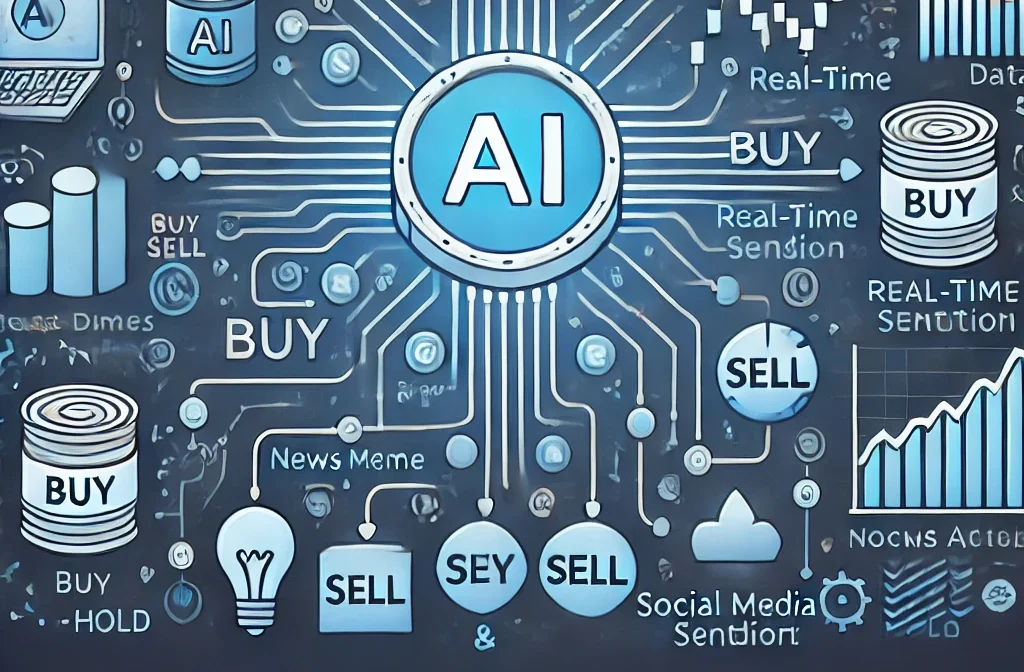Artificial Intelligence (AI) has emerged as a game-changer, revolutionizing industries across the globe, and the financial sector is no exception. In a world where split-second decisions can yield substantial profits—or catastrophic losses—AI has become a critical ally for investors. From algorithmic trading to personalized financial planning, AI redefines traditional investment practices, making the financial landscape more efficient, accessible, and dynamic.
1. Algorithmic Trading
AI has given rise to algorithmic trading, a domain once limited to large financial institutions and hedge funds. This advanced form of trading harnesses the power of AI to:
– Execute Trades with Speed and Precision: AI algorithms can analyze real-time market data and execute trades within milliseconds, seizing opportunities imperceptible to human traders.
– Reduce Human Error: AI minimises impulsive decisions that often plague human traders by removing emotional biases and relying purely on data-driven insights.
– Enable Complex Strategies: Sophisticated trading strategies, like arbitrage and statistical pair trading, are now more accessible to individual investors, levelling the playing field.
2. Predictive Analytics
Predictive analytics is a cornerstone of AI in finance, offering investors deeper insights and actionable foresight.
– Uncover Hidden Patterns: AI can process massive datasets to identify trends and correlations that even seasoned analysts might overlook.
– Risk Assessment: By analyzing factors such as global economic indicators, political developments, and company performance, AI helps investors make more informed decisions.
– Market Sentiment Analysis: By evaluating news articles, tweets, and financial reports, AI can gauge market sentiment, enabling investors to anticipate market movements with greater accuracy.
3. Personalized Investment Advice
The advent of robo-advisors powered by AI has democratized access to sophisticated financial advice.
– Tailored Portfolios: These platforms design personalized investment strategies based on an individual’s financial goals, risk tolerance, and investment horizon.
– 24/7 Monitoring: Unlike traditional financial advisors, AI-driven platforms continuously monitor market conditions and adjust portfolios to align with evolving circumstances.

– Cost Efficiency: Robo-advisors often come at a fraction of the cost of human advisors, making high-quality financial guidance accessible to a broader audience.
4. Fraud Detection and Security
AI is a powerful tool in combating financial fraud, ensuring the safety of investors and their assets.
– Real-Time Anomaly Detection: AI systems can flag irregular patterns in financial transactions, alerting institutions and users to potential fraudulent activity.
– Enhanced Cybersecurity: AI algorithms are instrumental in identifying vulnerabilities in financial systems and preemptively countering cyber threats.
The Broader Implications of AI in Investing
AI’s integration into the investment world extends beyond individual benefits. It has the potential to:
– Improve Market Efficiency: By processing and disseminating information faster than ever before, AI contributes to more efficient market pricing.
– Encourage Innovation: AI spurs the creation of new financial products and services, catering to the evolving needs of investors.
– Promote Financial Inclusion: By lowering costs and simplifying complex processes, AI makes investing accessible to underserved populations.
Challenges and Limitations
While the benefits of AI in investing are significant, it’s not without its challenges:
– Overreliance on Automation: Solely relying on AI can lead to unforeseen risks, especially during periods of extreme market volatility.

– Data Privacy Concerns: With AI systems processing vast amounts of sensitive data, ensuring privacy and compliance is critical.
– Ethical Considerations: As AI gains prominence, ethical questions about transparency, accountability, and fairness become increasingly pertinent.
The Road Ahead How AI is Transforming Investing
The future of investing is intertwined with the continuous evolution of AI technology. Innovations on the horizon include:
– AI-Powered Trading Platforms: These systems will offer more intuitive interfaces, allowing retail investors to access tools previously reserved for institutional players.
– Advanced Risk Management Tools: AI will play a pivotal role in developing predictive models that help investors mitigate risks more effectively.
– Hybrid Advisory Models: Combining the best of AI and human expertise, hybrid models are likely to dominate, offering a balanced approach to investment decision-making.
Conclusion -How AI is Transforming Investing
Artificial Intelligence is undeniably reshaping the financial landscape, unlocking unprecedented opportunities for investors. From optimizing trading strategies to ensuring robust fraud detection, AI’s contributions are multifaceted and transformative.
However, embracing AI requires a balanced approach. Human judgment remains indispensable, especially when navigating complex, high-stakes decisions. By leveraging the strengths of AI while acknowledging its limitations, investors can position themselves for sustained success in an ever-evolving market.
The age of the “Wall Street wizard” is here, and it’s powered by AI. For investors, the key is to adapt, learn, and evolve with these technological advancements to thrive in the dynamic world of finance.

